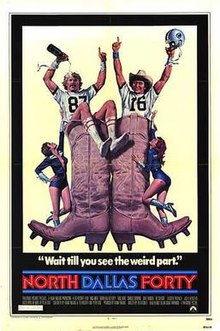North Dallas Forty
| North Dallas Forty | |
|---|---|

Promotional poster for North Dallas Forty
|
|
| Directed by | Ted Kotcheff |
| Produced by | Frank Yablans |
| Written by |
Peter Gent Ted Kotcheff Frank Yablans Nancy Dowd (uncredited) |
| Starring |
Nick Nolte Mac Davis Charles Durning Dayle Haddon Bo Svenson John Matuszak Steve Forrest G. D. Spradlin Dabney Coleman Savannah Smith Boucher |
| Music by | John Scott |
| Cinematography | Paul Lohmann |
| Edited by | Jay Kamen |
| Distributed by | Paramount Pictures |
|
Release date
|
|
|
Running time
|
119 minutes |
| Country | United States |
| Language | English |
| Box office | $26,079,312 |
North Dallas Forty is a 1979 American sports comedy-drama film starring Nick Nolte, Mac Davis, and G. D. Spradlin set in the world of American professional football. It was directed by Ted Kotcheff and based on the best-selling novel by Peter Gent. The screenplay was by Kotcheff, Gent, Frank Yablans and Nancy Dowd (uncredited). This was the first film role for Davis, a popular country music recording artist.
Wide receiver Phil Elliott (Nolte) plays for a 1970s era professional football team based in Dallas, Texas named the North Dallas Bulls, which closely resembles the Dallas Cowboys.
Though considered to possess "the best hands in the game", the aging Elliott is struggling to stay competitive and relies heavily on painkillers. Elliott and popular quarterback Seth Maxwell (Davis) are outstanding players, but they also characterize the drug-, sex-, and alcohol-fueled party atmosphere of that era. Elliott wants only to play the game, retire, and own a home with his girlfriend Charlotte (Dayle Haddon), who appears to be financially independent, and has no interest whatsoever in football.
The Bulls play for an iconic coach (Spradlin) who turns a blind eye to anything that his players may be doing off the field or anything that his assistant coaches and trainers condone to keep those players in the game. The Coach is focused on player "tendencies", a quantitative measurement of their performance, and seems less concerned about the human aspect of the game and the players. As one player (John Matuszak) finally erupts to a coach (Charles Durning): "Every time I call it a game, you call it a business. And every time I call it a business, you call it a game."
...
Wikipedia
